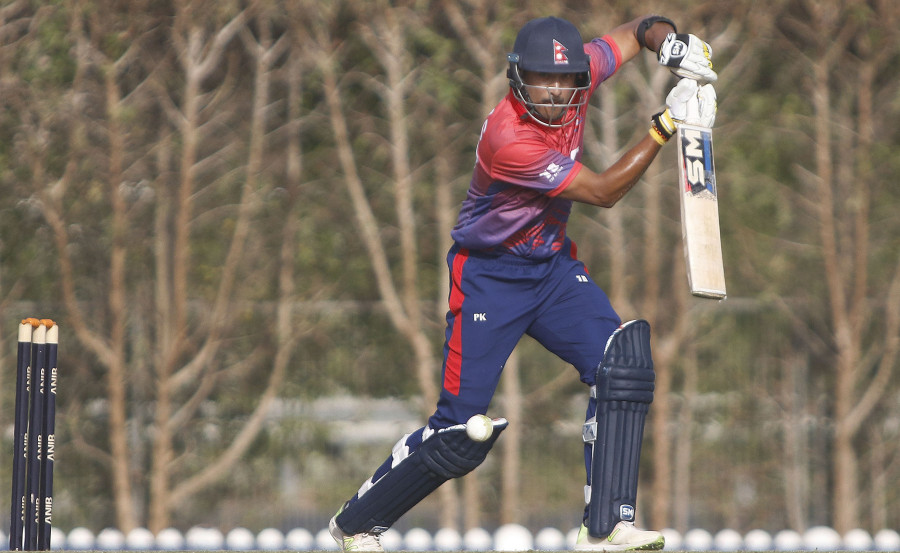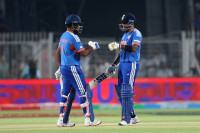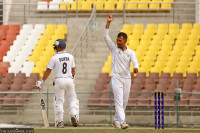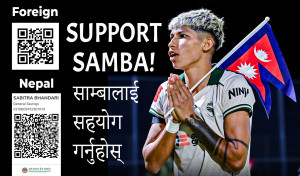Sports
Paras Khadka—the captain leading from the front
Since taking over the senior side in 2009, Paras Khadka has exhibited exemplary leadership and consistent performance. It has not been all walk in the park for him.
Adarsha Dhakal
Nepali cricket has been on a sticky wicket for quite some time. But not the cricketers. Nor has the support for Nepali cricket waned.
When the national team left for the United Arab Emirates for their three-match One Day International series last month, they had mixed hopes.
The opening match, however, was a disaster on January 25. With just 113 runs on the board, Nepal gave away the match to the UAE on a platter. Down 1-0, the second match, a day later, was crucial for Nepal. The team bounced back to level the series.
Two days later. January 28, 2019. It was a big day for skipper Paras Khadka and his boys.
At the sight was an opportunity to script a history-bringing home the first ever series win after the country earned the coveted ODI status in March last year.
Nepal invited the UAE to bat first and immediately took control of the first 20 overs. But some flamboyant batting by the UAE players towards the end of the innings, the match and a series victory seemed like a distant dream. By the end of the allotted 50 overs, the UAE had put a mammoth total of 254 on board.
After a good start—81 for 1 in the 15th over—Nepal lost the momentum midway through their innings. UAE spinners Imran Haider and Ashfaq Ahmed soon reduced Nepal to 129 for four. The team desperately needed somebody to anchor the innings. And as it has happened often in the past, Paras Khadka came to the team’s rescue.
Khadka batted through to the 39th over—and struck his and the country’s maiden ODI century—to ensure that Nepal were right in the game. When he fell after hitting a solid 115 off 109 balls, Nepal needed just 40 runs. Sompal Kami and Aarif Sheikh then took Nepal home with 32 balls and four wickets to spare.
Read: Records galore as Nepal win historic ODI series against UAE
It has not been all walk in the park for Khadka, though. While fans have showered him with bouquets, critics have hardly missed an opportunity to bowl brickbats at him.
Since taking over the senior side in 2009, Khadka has exhibited exemplary leadership and consistent performance. But his battle is not limited to the pitch. He has also been fighting against an inefficient administration since 2014 after the country got established as a cricketing nation following the ICC World Twenty20.
From the time Nepal began their journey towards upward trajectory with the 2012 ICC World Cricket League Division 4 in Malaysia to the 2014 ICC World Twenty20 in Bangladesh—their maiden appearance at the world stage—to becoming the latest members of the ODI club last year, Khadka has been at the heart of all these achievements.
Irked at the working style and passive approach of the country’s cricket governing body, Khadka, along with his teammates, appeared publicly to denounce Cricket Association of Nepal for corruption and inefficiency.
A few top office bearers faced corruption charges, but they were cleared later on. The unfolding chaos fractured the cricket governing body, which is under international suspension since April 2016.
Khadka has been wearing many hats. In the absence of CAN, Khadka works as a national team selector in an Independent Selection Committee formed by the ICC. And this has earned him enemies, who accuse him of nepotism and “running a syndicate”. Not surprisingly, there is a constant pressure on him not to fail.
He came into the ODI series at the ICC Academy Oval with a bad patch that began with the ACC Asia Cup Qualifier, where his highest score was 16 in five innings.
After Nepal attained the ODI status in March last year, expectations were high that the team would qualify for the Asia Cup to set up their dates with Test giants India and Pakistan. But it was not to be.
Team Nepal gained the ODI status largely on the back of his consistent performances in the ICC World Cricket League Division 2 in Namibia and the ICC Cricket World Cup Qualifiers in Zimbabwe. All the cricket administrators and fans alike forgot those contributions. But he has clung on to perseverance and focus, while making sure he does not get carried away. It will be wrong “to label me the man of big occasions,” Khadka told the Post after the historic series win over the UAE last Monday. “As long as I play as a cricketer, I will try to put in my best,” he said.
Former national team captain Binod Das, a long-time mate of Khadka, says the skipper is a man of fine mettle. “I don’t think he gets bogged down by things that go against him,” Das told the Post. “He is performing and that’s why he is fighting for justice,” said Das who was succeeded by Khadka as skipper a decade ago. “He’s the best one we have had so far.”
Das describes Khadka as a person full of self-belief. “This led him to this level of greatness.”
When Nepal lost to the UAE in the first game after being bundled out for 113 runs—their lowest one-day international total—there were calls that Khadka, who had scored 20, relinquished his captaincy.
Nepal staged a brilliant comeback with a thumping victory over the Emiratis to level the series at 1-1, but Khadka could only muster 21 runs in the game. He needed a big innings in the third and final game—not only to win the series but also to steer clear of a barrage of criticisms he could have faced in the event of yet another failure.
After bowling 10 overs with his medium pace in the first innings and taking two wickets, Khadka returned with the bat and occupied the crease for almost two and a half hours. Despite cramps that required medical intervention three times, Khadka scored his and country’s first ton.
“I don’t need to reinvent myself,” said Khadka. “I have been playing for the national team for the last 14-15 years; if I still have to prove it, it’s not worth it.”
What makes Khadka hold his ground?
“His attitude towards life—and the game,” Das told the Post.
“This is what gives him so much of confidence—to shake off all that is happening off the field. To perform at the highest level, you need to have a certain level of belief in your skill. He has plenty of self-belief.”




 9.89°C Kathmandu
9.89°C Kathmandu















